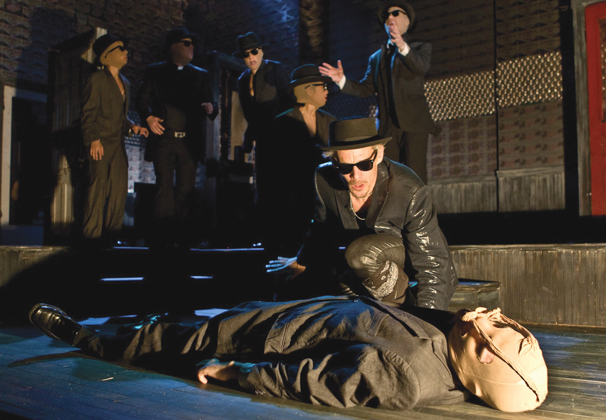
Jonathan Marc Sherman’s new play “Clive,” based on Bertolt Brecht’s “Baal,” is confident in its risks. It may seem absurd to minimize a 100-minute, 21-act play filled with sex, drugs and immorality to a single word, but the play itself is so absurd that it is really the best introduction to the work.
Ethan Hawke (“Before Sunrise”) directs and stars as the predictably eccentric title character. Most of the play follows his personal self-sabotage and descent from depraved to immoral, all while pondering his existence. He is guided by Doc, played by a scene-stealing Vincent D’Onofrio (“Full Metal Jacket”), who starts off as a devilish mentor before assuming a role that more closely resembles a drinking buddy. Zoe Kazan (“Ruby Sparks”) also stars as many of Clive’s lovers, playing each with a different level of vivacious sadness.
In Brechtian fashion, the audience is constantly reminded that they are watching a play. The fourth wall is broken, the lighting calls attention to itself and the characters speak the stage direction. At times these elements are incredibly effective, but occasionally they fall flat. Overall, the audience is left pondering the seemingly opposing ideas of Brechtian distancing and a melodramatic demand for emotions.
While Brecht wanted to remind the audience that they were watching a play so they could focus on the ideas instead of sentiments, “Clive” seeks to use these techniques to heighten the emotion. Despite this seemingly problematic dichotomy, the play succeeds more than it fails.
Another Brechtian trope is the use of musical interludes. Led by Clive’s guitar, the entire cast often joins in, and in these moments, the play is sublime. The power built up in the surrounding story is felt in the vocals and musicality. These scenes succeed at being the most fun and emotional moments.
Throughout the entire play there is a feeling that this is Hawke’s show. Sherman acts in a few smaller roles, but Hawke’s intricate, in-your-face direction and intense performance really make the play. He portrays an unlikable character with a fascinating and immediate intensity, but by allowing himself to be vulnerable, he gains the trust and support of the audience.
Not everything in this ambitious production works. It’s unapologetically elusive, and this will frustrate many. But as one of the characters says, “Any story that can be understood is a bad story. Stories should be felt.” “Clive” is hard not to feel thanks to its fearlessly bold execution.
“Clive” is presented by the New Group and is playing now through March 9 at the Acorn Theater, located at 410 W. 42nd St.
A version of this article was published in the Wednesday, Feb. 27 print edition. Drew Gregory is a staff writer. Email him at [email protected].






















































































































































